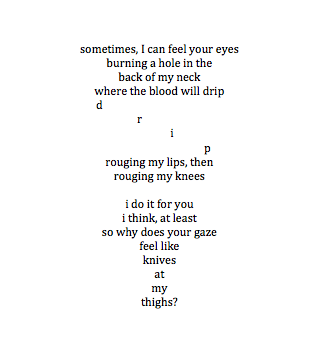A space for women’s voices in Cambridge?
– Daisy Hughes
Before I came to Cambridge, I’d never particularly noticed that I was a woman. Of course, I was aware of my sex in a physical sense, and even my gender in a social sense. But I’d never really politically identified as a woman. I’d never really felt in my admittedly very privileged upbringing that there was less space in the world for me and my voice because I was a woman. I would’ve called myself a ‘feminist’, but I’d never really noticed how that term had specific relevance to me.
But then I came to Cambridge. And not only did I come to Cambridge, but I decided that while I was here I wanted to try and change some things about this place.
I began my involvement with the Living Wage Campaign towards the end of my first year. It had taken me a while to settle in to this strange world and I finally felt that I was able and ready to engage with it in a different way. It was during the course of this campaign, however, that I really began to notice how little space there is here for women who want to take part in, let alone lead, any form of political action.
I was running the campaign with a male friend of mine, who I have a huge amount of respect for. However, each time there was any reporting on the campaign it was always his name and not mine that was mentioned. Each time anyone had a question about what we were doing and why, they would address him and not me. It was as though people were assuming that he was the leader, while I was the secretary. I found myself in JCR meetings in which his voice was privileged over mine – in which he was listened to, while I was spoken over and dismissed.
Finally, a man with whom I had previously been involved, suggested to me that the reason I was doing these things – the reason I was dedicating hours of my time and all of my emotional energy to a campaign I was sure I believed in myself – was because I had become friends with another strong, vocal woman in our college. I was quite literally being denied a voice of my own, by someone who I had previously assumed respected me. Implicit in his comment was a fear of women who speak out, and it was framed as ‘concern’ for the influence she appeared to have over me. Clearly, I couldn’t be doing these things because I wanted to do them.
As a woman involved in ‘activism’, I found I was far more likely to be painted as a ‘radical’ than my male counterparts – although clearly this goes alongside a fundamental misunderstanding of what this term actually means. Very simply, I was ‘radical’ because I had noticed an injustice taking place in our community, and as a woman, my place in pointing this out and fighting against it was unexpected and unwanted.
It is too easy, in this very male-dominated and male-orientated environment, for women who speak out to be silenced. One only has to look at the treatment of the Women’s Campaign in the student press to see a persistent fear of the female voice. There is very little space here for women to have this voice and trying to carve one out is, frankly, exhausting.

